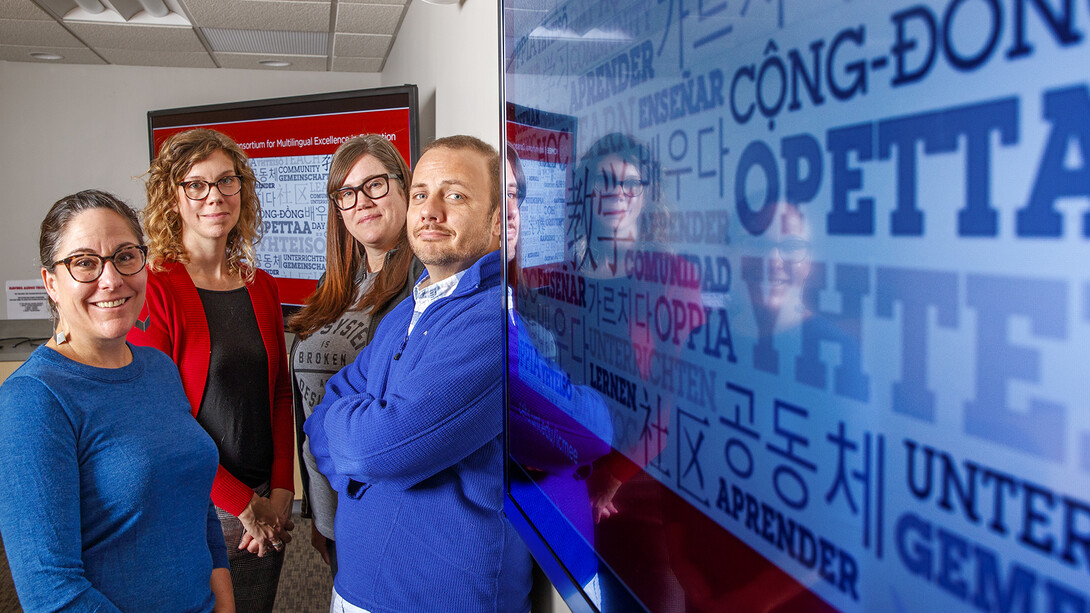
Public school teachers face formidable challenges in educating the growing population of multilingual students, who have varying levels of English fluency, different home languages and different cultural expectations of education.
And, although federal law requires districts to offer professional development, the training offered to teachers of multilingual students varies widely across states and even school districts.
University of Nebraska–Lincoln education researcher Kara Viesca aims to close the training gap by developing research-based programs that offer information and support to K-12 teachers who serve multilingual students. Although offered virtually, the programs encourage educators to collaborate and mentor one another, providing a built-in support system of other professionals.
Armed with the right tools, educators are better positioned to create effective learning environments for their students. In the U.S., estimates show that more than 50% of K-12 public school teachers have at least one student classified as an English language learner — a student not fluent in English who needs modified instruction.
Viesca and her team are using a $2.7 million grant from the U.S. Department of Education’s Office of English Language Acquisition to build upon a set of e-workshops it previously designed, with the goal of expanding their use into at least 11 new states and developing new versions for different groups of educators, such as school psychologists and special education teachers.
They’re also researching the outcomes of educators who participate, pinpointing successful strategies for helping teachers of multilingual students.
Respecting students’ home languages and cultural backgrounds are trademarks of programs developed by Viesca’s team. It’s important for teachers to learn how to maximize multilingualism’s potential to help students learn more effectively, affirm their identities and feel safe at school, she said.
“There is often a monolingual approach, in that we ‘treat’ what we see as a deficiency in English,” said Viesca, associate professor of teaching, learning and teacher education. “This ignores the rich ability and knowledge of speakers of multiple languages. We want teachers to recognize the value of home languages in the classroom.”
That approach also acknowledges that multilingual students could be dealing with serious social and mental health issues resulting from racism and xenophobia from classmates, or family separation through deportations, for example.
Viesca began developing the workshops in 2011, when she was at the University of Colorado Denver, with a $1.9 million grant from OELA.
They gained a foothold in Colorado, with more than 150 teachers completing e-workshops. That success paved the way for the current project — the International Consortium for Multilingual Excellence in Education — launched in 2016. The ICMEE team has been working to increase the number of states and teachers using the e-workshops.
They made a major advance in 2018, when ICMEE forged a partnership with WIDA, a consortium of 40 states, territories and federal agencies that designs and implements standards and assessments around English language development. WIDA is also growing its professional development opportunities for educators working with multilingual learners.
WIDA piloted three of the ICMEE e-workshops in seven states in spring 2019 and subsequently made them available to all members. That exposure prompted eight member states to purchase additional e-workshops.
ICMEE is also targeting increased use of the e-workshops in Nebraska, which is home to about 23,200 ELLs, or about 7% of the state’s public school students, according to the Nebraska Department of Education. On Nov. 2, ICMEE hosted a group of roughly 30 Nebraska education professionals to learn about stakeholder needs.
Understanding how the e-workshop model impacts teacher learning is part of ICMEE. Traditional teacher professional development is very top-down and tightly regulated, Viesca said.
E-workshops give teachers greater agency in what, when and how they learn. They do not have facilitators, a setup that encourages peer mentoring.
“Teachers should be looking to each other,” Viesca said. “We want to shift the locus of power from the university and other external groups to teachers in the classrooms.”
The research results will likely apply to all teachers, regardless of whether they work with multilingual students. Viesca said many educators perceive existing professional development opportunities as ineffective and out of touch with day-to-day classroom challenges.
“Many teachers feel somewhat de-professionalized by outside groups saying, ‘I know what’s best for you,’” Viesca said. “It’s not an insignificant issue — professional development is required across the nation.”
The project also strengthens education research internationally.
Viesca’s team has partnered with colleagues in Europe to disseminate the e-workshops to hundreds of teachers in Finland and Germany. Last year the international team conducted 32 observations across Germany, Finland, the U.K. and the U.S., in classrooms where teachers are known for excellence in working with multilingual students. Though that work was not funded by the DOE grant, it’s an example of the international teamwork the project was designed to foster.
The Husker team includes Lauren Gatti, associate professor; Tricia Gray, assistant professor of practice; Aaron Johnson, assistant professor; Lydiah Kiramba, assistant professor; and Justin Olmanson, assistant professor, all of the College of Education and Human Sciences’ Department of Teaching, Learning and Teacher Education. The team also includes 14 current and former students, including Jessica Mitchell-McCollough, ICMEE project coordinator and doctoral candidate in education and human sciences.







